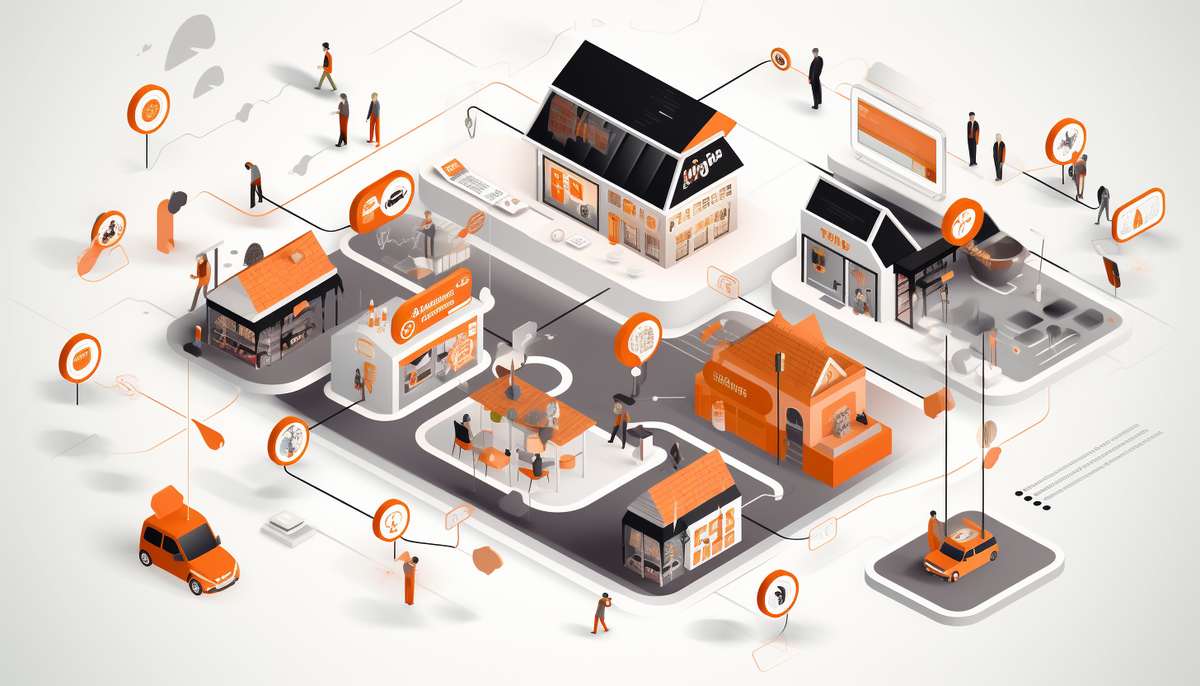A B2B store requires features & functionality to meet the unique business needs. So let’s compare 7 B2B commerce platforms.
According to Grand View Research, the global business-to-business (B2B) eCommerce market was valued at USD 7,907.07 billion in 2022 and is anticipated to grow at a Compound Annual Growth Rate (CAGR) of 20.2% from 2023 to 2030.
Industries such as books & stationery, consumer electronics, sports apparel, beauty & personal care, healthcare, home & kitchen, clothing, industrial & science, and automotive are among the most popular sectors in B2B. These industries have successfully captured the B2B market, with their products experiencing high demand.
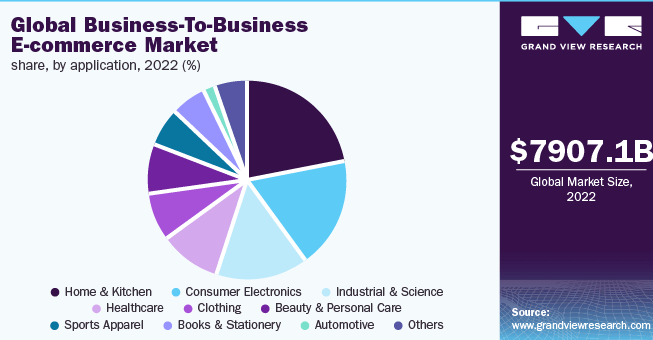
So obviously, the competition between businesses for top places in the B2B industry won’t be easy. So if you are planning to create your multi-vendor marketplace, you need to choose a cutting-edge platform now to stay competitive and offer excellent customer experience, including personalization and convenience.
Trends in B2B eCommerce
The choice of a B2B eCommerce platform depends on industry trends and the understanding of key differences between B2B and B2C. In the B2B segment, businesses customize their sales and customer service strategies to meet customer needs. Therefore, it is crucial to outline these factors to choose the right platform for the B2B marketplace that aligns with the specific requirements of the target audience. Let’s review these factors:
1️⃣ Buying Decisions: Facts vs Emotions
Buying decisions in B2B eCommerce are planned, logical, and value-driven rather than based on impulse and emotions like many B2C purchases. B2B purchasing decisions are based on business needs and often follow a cyclical purchase schedule.
2️⃣ Decision-Makers: Groups vs Individuals
Groups of multiple people make B2B buying decisions. In this segment, purchase decisions have to follow an established procurement process and may require approval by various managers and departments.
3️⃣ Buying Cycles: Long vs Short (or Complex vs Simple)
Buying cycles in the B2B landscape tend to be long and complicated. The B2B purchasing process involves several departments and individuals, both the sellers and the buyer. Multiple decision-makers need access to information that is most relevant to them.
4️⃣ Focus: Convenience, Speed, and Relevance vs. Needs and Wants
B2C buyers consider their needs and desires when deciding on buying a product and then pick the product that best fits those needs. In contrast, B2B buyers prioritize business needs and requirements when making purchasing decisions. B2B buyers assess products based on their ability to address specific operational challenges, align with organizational goals, and provide value to the business.
Vital B2B eCommerce Features
Trends in the industry dictate that B2B eCommerce platforms are meant to be more complex than B2C ones since they should provide unique and complex features that help businesses deliver a personalized, seamless, and efficient buying experience. B2B store capabilities must support dealing with large and diverse quantities of products, prices, orders, payment options, etc.
Given the distinct needs in the B2B sector, eCommerce stores catering to business-to-business relationships require a specific set of features:
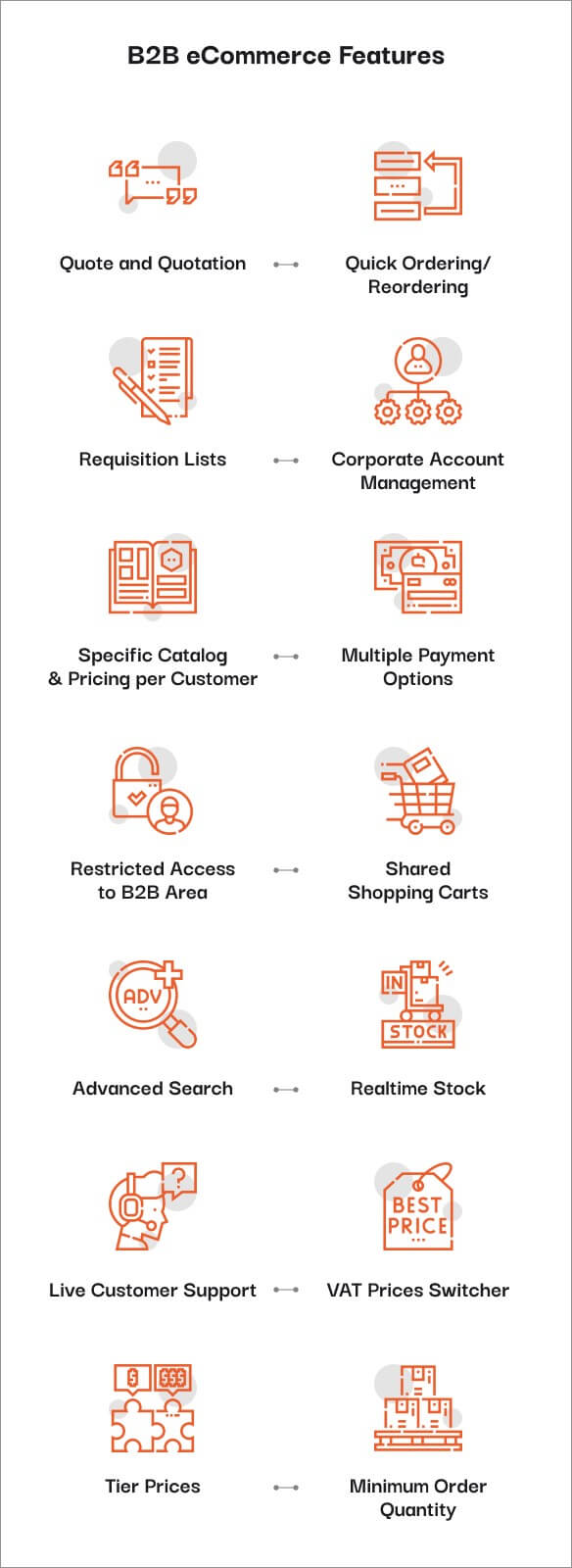
🟠 Quote and Quotation: Generating and managing quotes allows B2B companies to provide accurate pricing, negotiate terms, and finalize orders.
🟠 Requisition Lists (Multiple WIshlists): By creating lists of desired products for various purposes, such as project planning or procurement, B2B customers can quickly manage multiple lists of items they intend to purchase.
🟠 Corporate Account Management (Company with Roles): By managing corporate accounts, companies maintain control over purchasing activities, enable centralized management of accounts, and facilitate collaboration within organizations.
🟠 Specific Catalog and Specific Pricing per Customer (Shared Catalog): Custom catalogs ensures that each customer sees relevant products and pricing tailored to their specific needs.
🟠 Multiple Payment Options: Offering multiple payment options, such as pay by invoice, company credit, check/money order, and online payment gateways, caters to the diverse preferences of B2B buyers. It accommodates different purchasing workflows and simplifies the payment process.
🟠 Restricted Access to B2B Area: This feature ensures that sensitive information, such as pricing, product details, or order history, is protected and accessible only to individuals within the business.
🟠 Shared Shopping Carts: With this feature, the organization can add products to a single cart, share it with colleagues, and collaborate on the order to facilitate teamwork and improve efficiency in multi-user environments.
🟠 Advanced Search: With it, buyers can quickly find specific products or narrow down their search and increase the likelihood of finding relevant products efficiently.
🟠 Realtime Stock: Displaying stock levels in real-time enables buyers to plan their orders and avoid delays or backorders. Accurate stock information reduces order errors and improves supply chain management.
🟠 Live Customer Support: Chat or phone support provides businesses the opportunity to resolve any issues, and build stronger relationships with customers by providing personalized and timely assistance.
🟠 VAT Prices Switcher: This feature allows customers to toggle between prices inclusive or exclusive of Value Added Tax (VAT) based on their location or tax status, ensure compliance with tax regulations, and minimize confusion regarding pricing.
🟠 Tier Prices (Discounts Based on Price Amount): With tier pricing, B2B stores offer discounts based on the quantity or value of products ordered. It enables businesses to strategically manage pricing strategies and drive higher order values.
🟠 Minimum Order Quantity: Implementing this feature feature allows businesses to set a minimum threshold that customers must meet for successful order placement and thus optimize order fulfillment processes.
Best Platforms for B2B Shopping
Let’s start by reviewing 7 top platforms with B2B capabilities. We have compiled a list of the most popular solutions for entrepreneurs. Following a brief overview of each platform, we will compare their features based on the list mentioned earlier. So, stay tuned!
#1 B2B: Magento Open Source
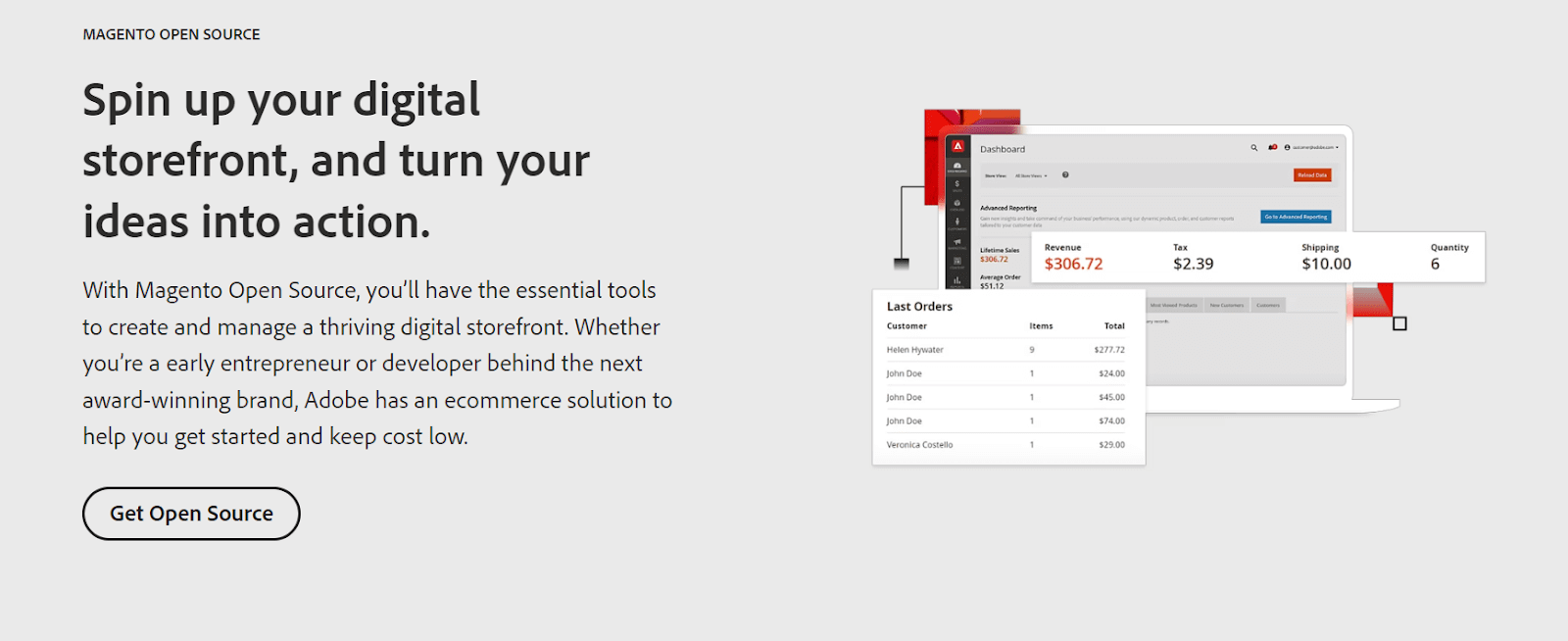
Magento Open Source equips small B2B businesses with a comprehensive set of tools and features to optimize their eCommerce operations.
With its capabilities for catalog management, pricing customization, order handling, self-service account management, customizable workflows, integration options, customer group management, and analytics, Magento Open Source provides the necessary foundation for B2B businesses to create scalable and tailored eCommerce solutions.
#2 B2B: Adobe Commerce
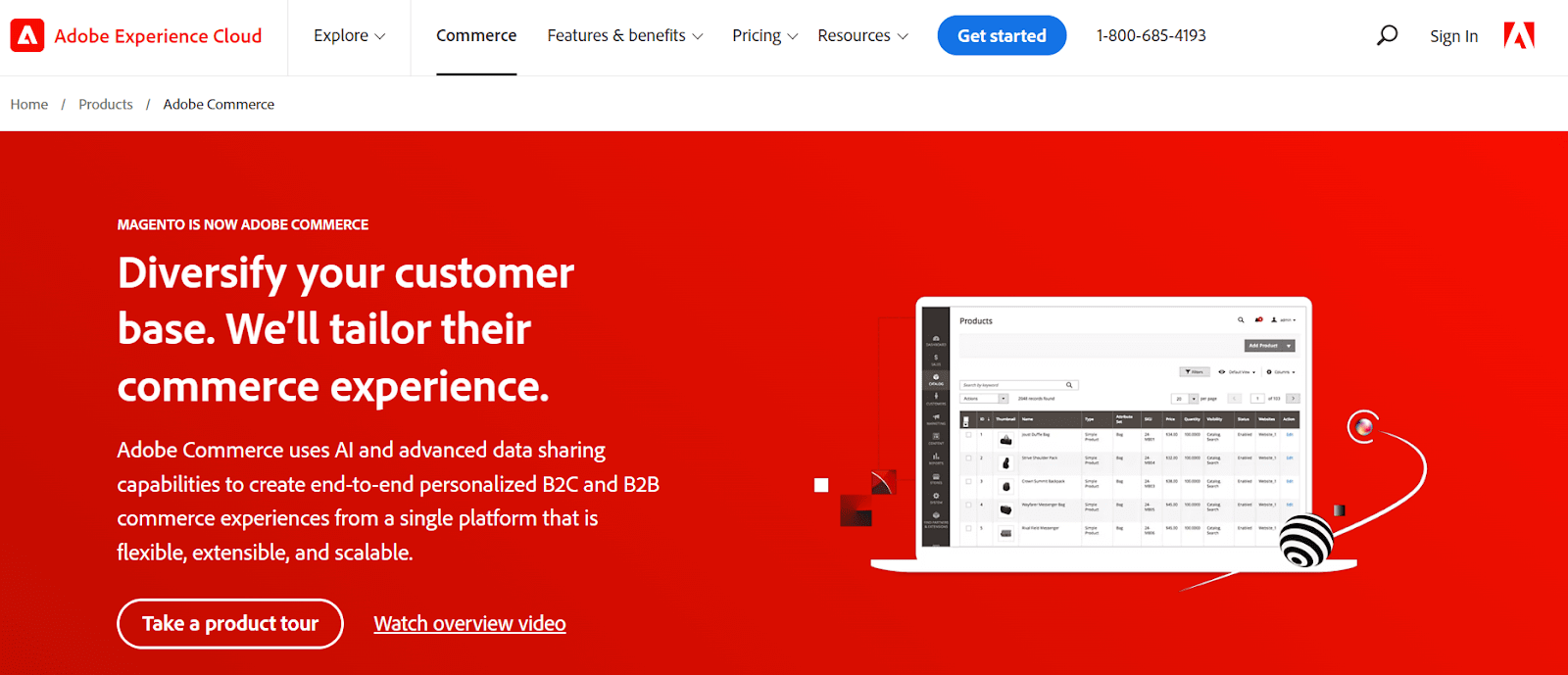
Adobe Commerce, formerly known as Magento Commerce, is a leading eCommerce platform that has gained recognition for its scalability and customization suited for large and mid-sized businesses, including B2B.
With Adobe Commerce, companies can easily manage their complex purchasing processes, streamline workflows, and improve the overall efficiency of their operations. The platform is well-known for its modular architecture that helps seamlessly integrate with third-party services, such as ERPs, CRMs, AMS, etc.
#3 B2B: Shopware
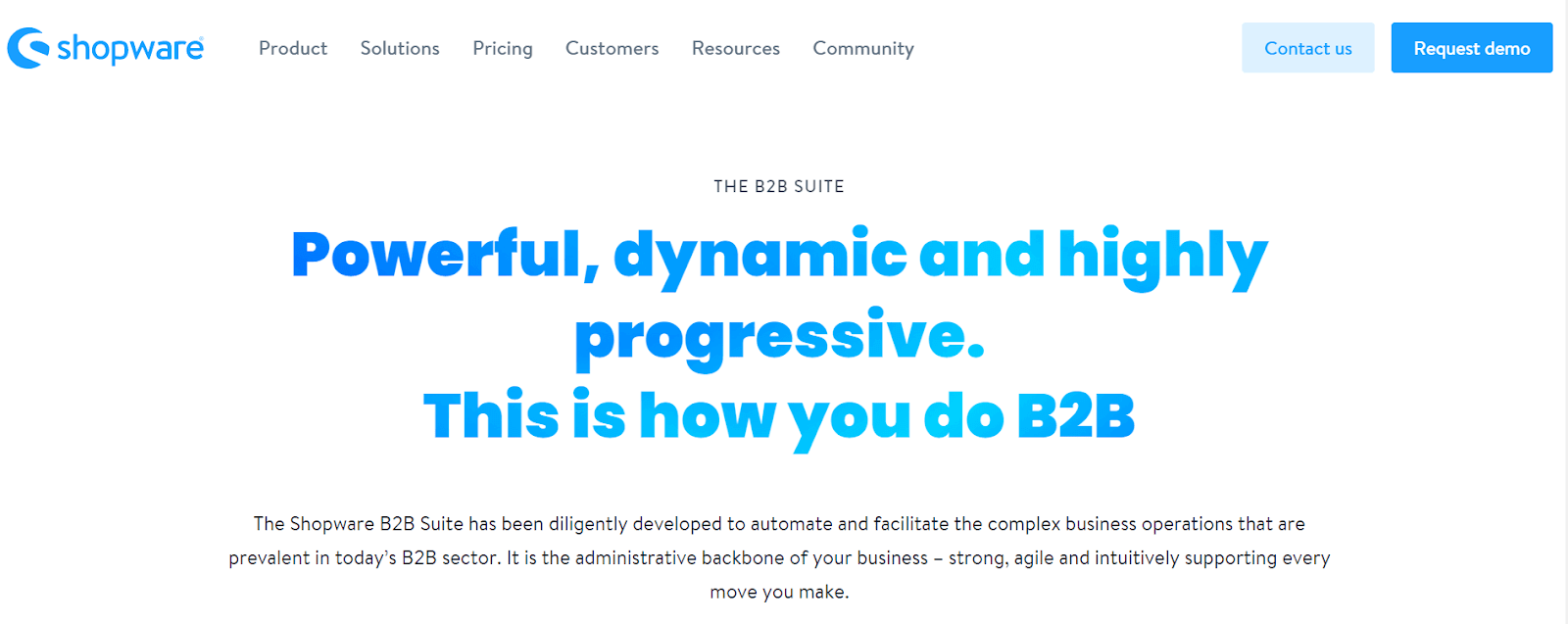
Shopware B2B Suite is specifically designed for small companies venturing into the B2B sector. It offers a user-friendly interface and intuitive features, making it an excellent choice for beginners and their partners.
The emphasis on ease of use simplifies the decision-making process for those new to B2B eCommerce, allowing them to quickly adapt and navigate the platform.
#4 B2B: Commercetools
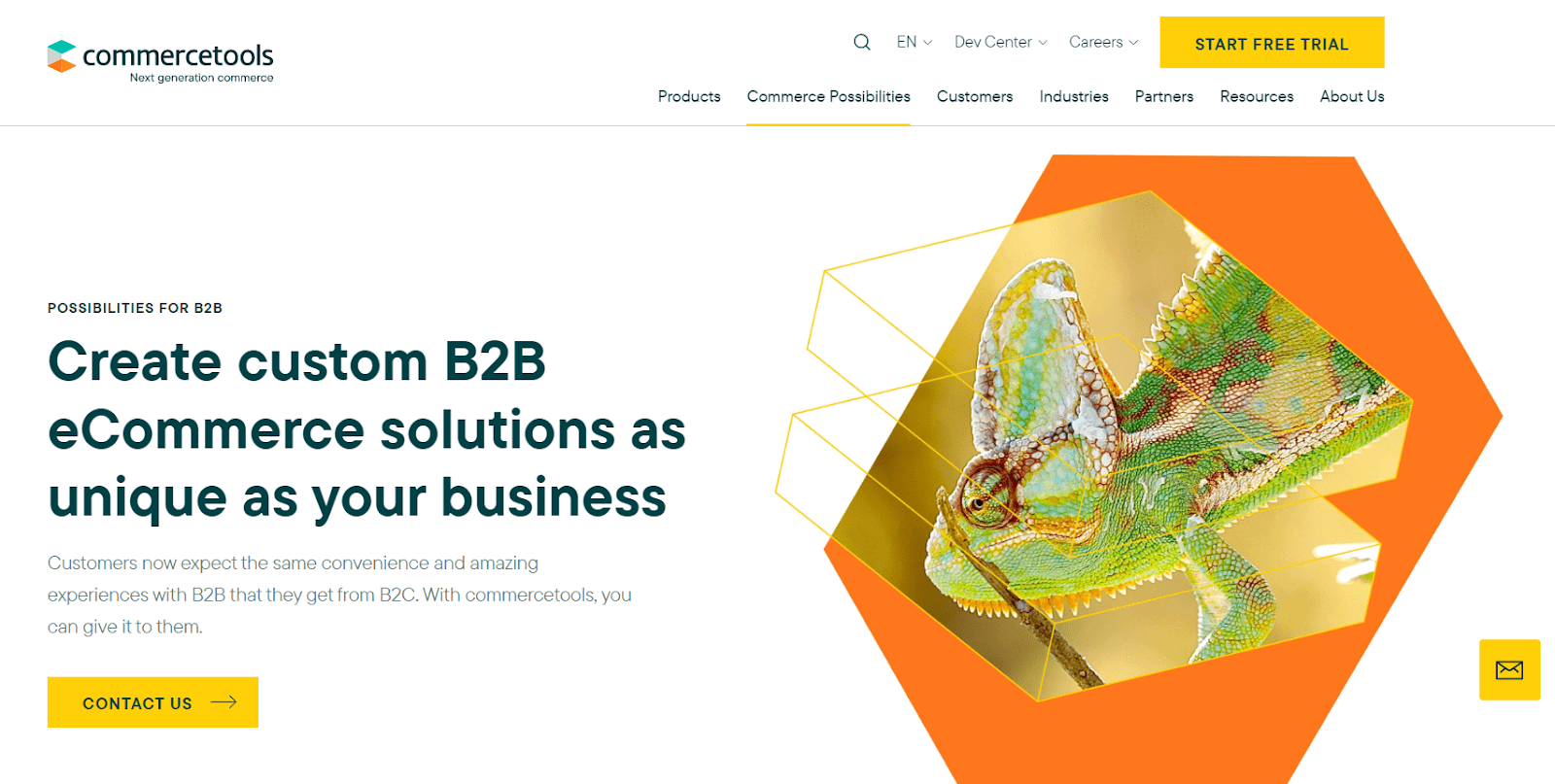
With its API-driven and headless architecture, Commercetools offers flexibility and scalability for B2B businesses. It enables companies to build tailored eCommerce solutions and seamlessly integrate with existing systems.
One key B2B capability of Commercetools is its support for complex workflows. B2B businesses can customize and automate processes such as order processing, approvals, and procurement. This streamlines the purchasing journey, ensuring adherence to specific business rules and requirements.
#5 B2B: BigCommerce
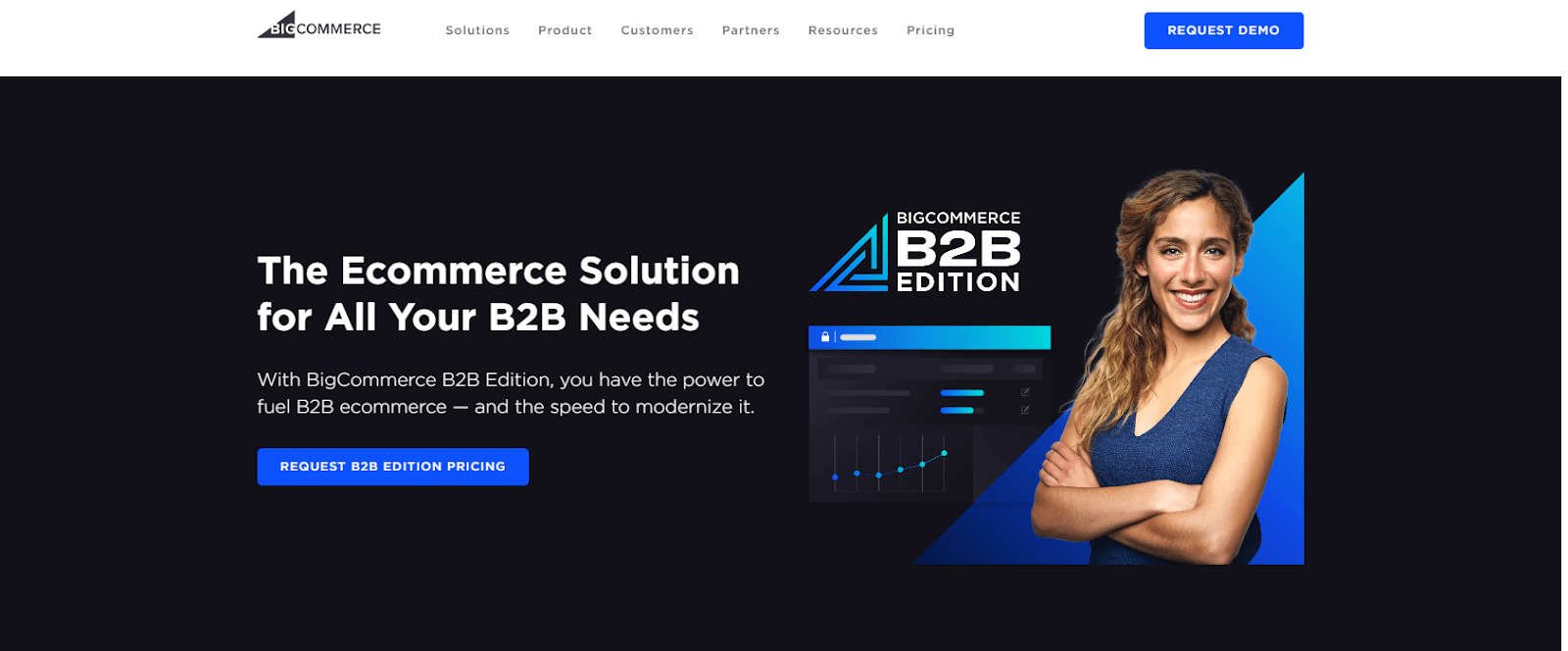
BigCommerce B2B edition wins the audience thanks to a lower total cost of ownership. Mid-market and enterprise brands often choose BigCommerce, even though it cannot offer as much flexibility as Adobe Commerce (almost no platform can 🤷), which is also a choice of large and mid-sized companies.
#6 B2B: Shopify Plus
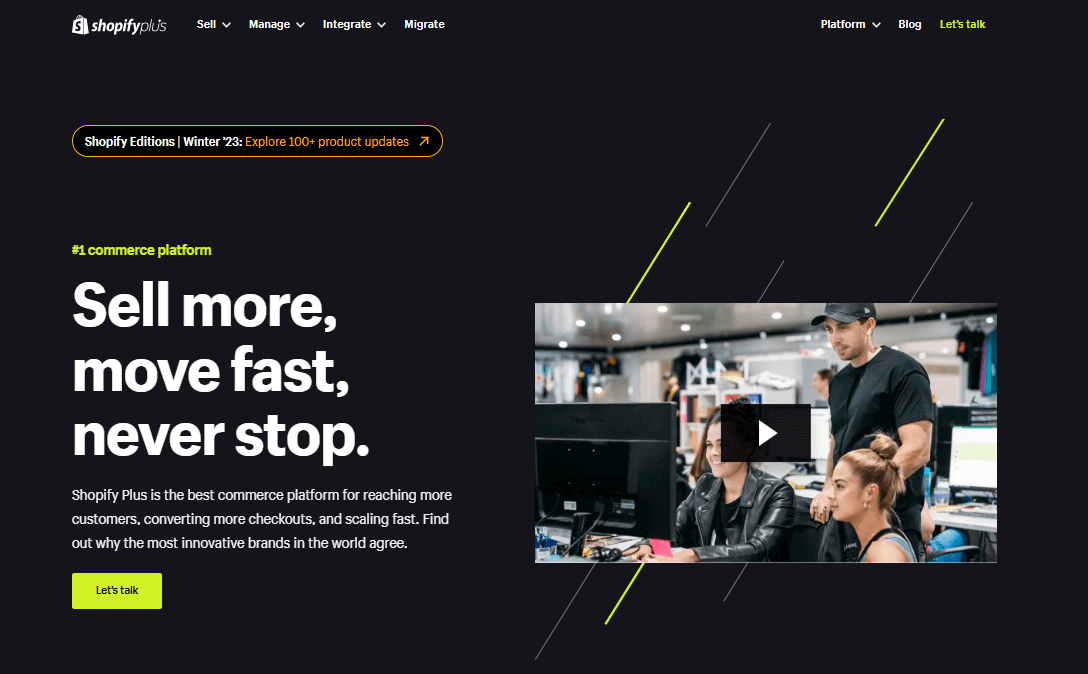
Shopify is now a leading ecommerce solution thanks to its lower technical overheads, pleasant look, simple functionality, and managed scalability. Shopify Plus introduced a new level of shopping experience for businesses, uncovering B2B features that require fewer customization efforts than, for example, those of Adobe Commerce.
Indeed, the simplicity of Shopify Plus makes running a B2B business extremely convenient: ease of use and user-friendly interface helps to adapt faster to the platform’s functionality, while streamlined inventory management, order fulfillment, and payment processing eliminate human error. Yet, Shopify Plus sacrifices the customization of the platform because of it.
#7 B2B: OroCommerce
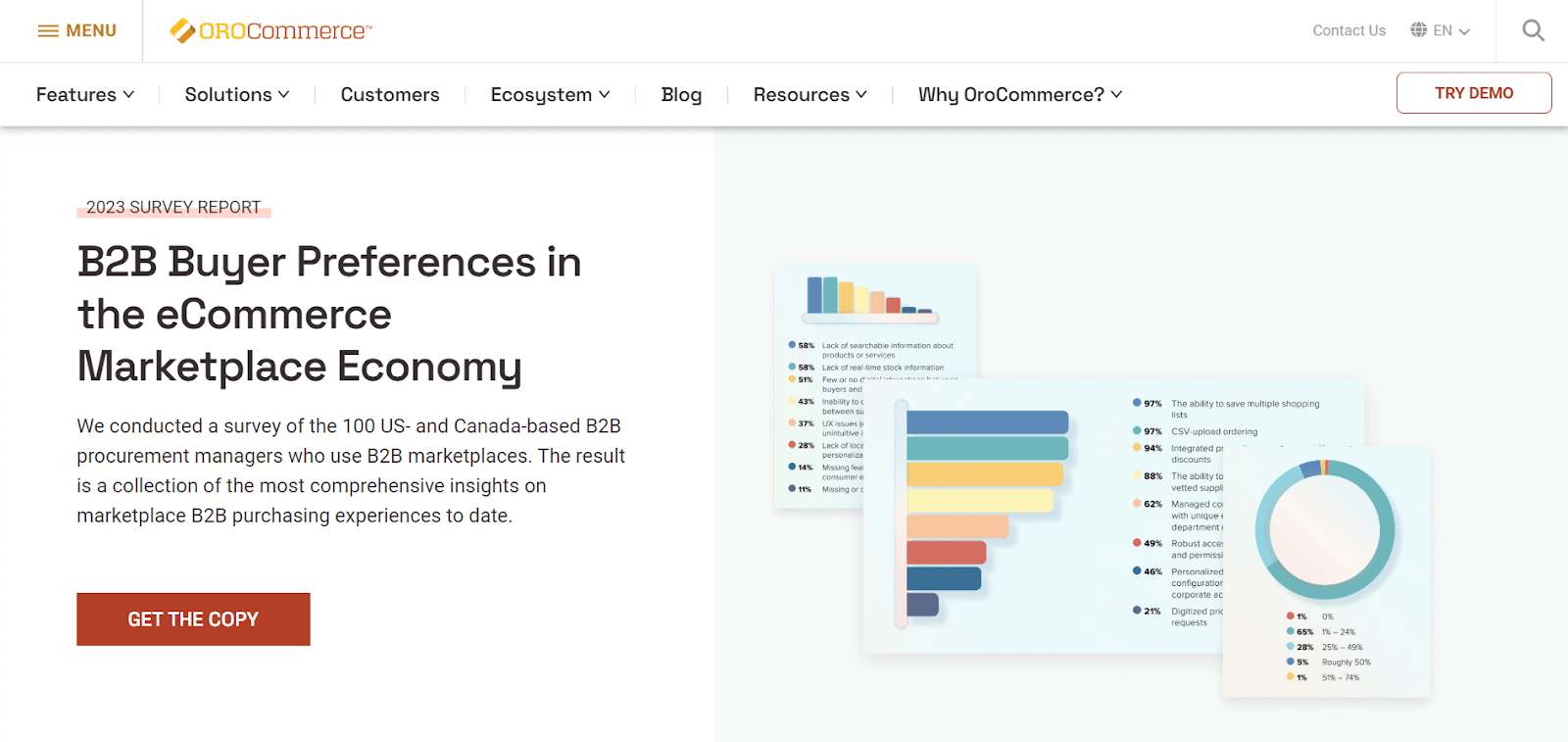
OroCommerce is a platform specifically designed for B2B businesses, offering a range of capabilities to cater to their unique requirements. Its focus on B2B-specific features, such as workflow management and flexible pricing, makes it an excellent choice for organizations looking to optimize their B2B eCommerce operations and deliver exceptional customer experiences.
Feature Comparison of B2B eCommerce Software
Let’s waste no time and check the feature comparison of the mentioned platforms!
Conclusion: Which B2B Sales Platform Should I Choose?
By assessing the capabilities of each platform, businesses can make informed decisions based on their size and specific requirements. For large companies, which are supported by a dedicated development team, Adobe Commerce suits best since it provides a feature-rich solution and scalability. BigCommerce may also be well-suited for large corporations but is not as flexible as Adobe Commerce.
Mid-sized companies can consider platforms such as Magento Open Source, which offers advanced customization, robust integration options, and offer a range of extensions to enhance the capabilities of B2B stores. Additionally, Shopify Plus provides scalability, a user-friendly interface, and a good selection of apps for extending B2B stores’ functionality. And with OroCommerce or Commercetools, mid-sized B2B businesses can benefit from advanced functionalities like customizable workflows, pricing, and multi-website management.
Small companies entering the B2B sector may find Shopware B2B Suite to be an excellent fit due to its easy-to-use interface and intuitive features.
Whether it’s the extensive functionality for large enterprises, the flexibility and scalability for mid-sized businesses, or the user-friendly approach for small companies, we are here to consult you on the solution that can be the best for your business.




